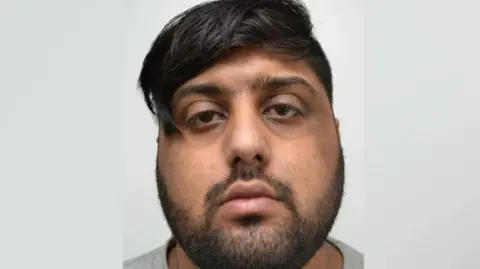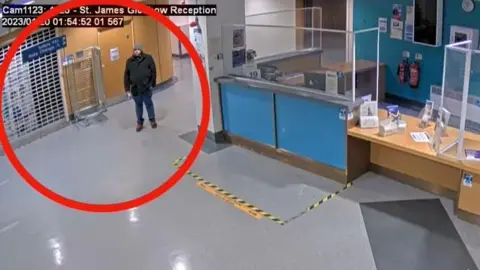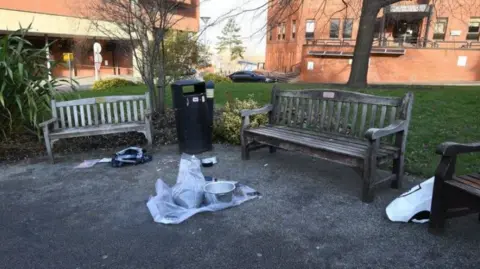By Alex Moss, Emma Glasbey, BBC News

 West Yorkshire Police
West Yorkshire Police
A man who plotted to bomb a hospital in Leeds and an RAF base has been found guilty of preparing acts of terrorism.
Mohammad Farooq, 28, targeted St James’s Hospital in January 2023 but was stopped by a member of the public.
A trial at Sheffield Crown Court heard how the clinical support worker had planned to “kill as many nurses as possible” by detonating a pressure cooker bomb.
Jurors unanimously convicted Farooq, of Hetton Road in Leeds. He will be sentenced at a later date.
Farooq was employed by the hospital at the time as a nursing assistant.
He was stopped from carrying out the attack by a patient who moved him away from the building, talked him down and called police.
The court heard how Farooq’s first target was RAF Menwith Hill, a spy base near Harrogate which is operated by US and UK staff.
When he thought that was not possible, jurors were told Farooq then switched to the “softer and less well-protected target” of St James’s Hospital in the early hours of 20 January last year.

 Counter Terrorism Policing North East
Counter Terrorism Policing North East
Farooq was arrested outside the hospital with the pressure cooker bomb, which was designed to be twice as powerful as those used by the Boston Marathon bombers in 2013.
The court was told he had immersed himself in an “extremist Islamic ideology” and went to the hospital to “seek his own martyrdom” through a “murderous terrorist attack”.
Prosecutor Jonathan Sandiford KC said he had a grievance against several of his former colleagues and had been conducting a poison pen campaign against them.

 Counter Terrorism Policing North East
Counter Terrorism Policing North East

 Counter Terrorism Policing North East
Counter Terrorism Policing North East
Mr Sandiford said Farooq’s plan was to detonate the bomb, then kill as many people as possible with knives before using an imitation firearm to incite police to shoot him dead.
The prosecutor said “two pieces of good fortune intervened” to stop the planned attack.
The first was that a bomb threat he sent in a text message to an off-duty nurse in order to lure people to the car park where he was waiting was not seen for almost an hour, so the full-scale evacuation he had hoped for did not happen.
Mr Sandiford said Farooq left but returned shortly afterwards with a new plan to wait in a hospital cafe for a staff shift change and detonate his device.
But the court heard “luck intervened again” because a patient, Nathan Newby, was standing outside the hospital having a cigarette and “noticed the defendant”.
‘Extremely dangerous’
He said: “Mr Newby realised something was amiss and began to talk to him instead of walking away.
“That simple act of kindness almost certainly saved many lives that night because, as the defendant was later to tell the police officers who arrested him, Mr Newby succeeded in ‘talking him down’.”
An investigation found he had become self-radicalised through accessing extremist material online, and had obtained bomb-making instructions in a magazine published by Al Qaeda to encourage lone wolf terrorist attacks against the West.
Movements of Farooq’s mobile phone and car showed he made at least two visits to the area of Menwith Hill in the 10 days leading up to his arrest, jurors were told.
Mr Sandiford said the base had been designated as a target by IS because it was believed it had been used to co-ordinate drone strikes against terrorists.
Farooq admitted firearms offences, possessing an explosive substance with intent and having a document likely to be useful to a person preparing or committing an act of terrorism.
Counter terrorism police described Farooq as an “extremely dangerous individual”.
Det Supt Paul Greenwood, Head of Investigations for Counter Terrorism Policing North East, said the defendant was “primarily motivated by a Daesh-inspired ideology, but also by his own, deep-seated grievances”.
He added: “We are sincerely grateful for the actions of Nathan Newby that morning, whose bravery and willingness to calm Farooq prevented him from fully realising his plans.
“Had he not intervened the outcome could have been devastating.”
Follow BBC Yorkshire on Facebook, X (formerly Twitter), and Instagram. Send your story ideas to yorkslincs.news@bbc.co.uk.








